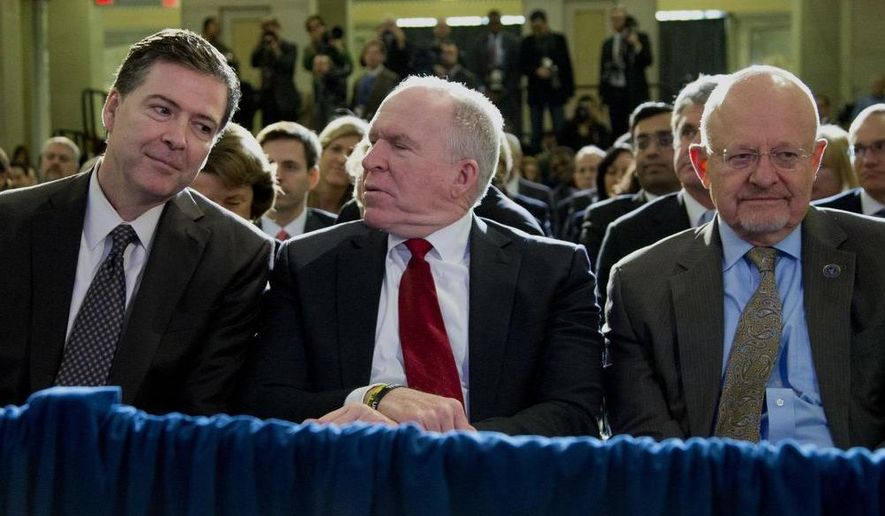U.S. intelligence agencies’ far-reaching conclusion that Vladimir Putin interfered in the 2016 presidential election to specifically help Donald Trump was flawed by “tradecraft failings,” says a House report.
The conclusion was written by the CIA then under the direction of Obama loyalist John O. Brennan.
The report said the CIA’s Putin-Trump analysis violated standards for analyzing intelligence products and noted that one guideline is to “be independent of political considerations.”
It said the CIA’s draft section on Mr. Putin’s intentions lacked vigorous internal debate because it was restricted to an “unusually constrained review” by other agencies.
The findings are contained in the Republican majority report of the House Permanent Select Committee on Intelligence investigation into 2016 Russian election meddling.
The intelligence agencies’ January 2017 Putin-Trump conclusion produced wide-ranging political ramifications.
It buttressed the argument from Hillary Clinton, who from the moment she lost to Mr. Trump cited Russia as the reason. Obama loyalists, such as Mr. Brennan and former National Director of Intelligence James R. Clapper, have suggested that Mr. Trump is a Putin agent.
House intelligence committee Republicans agreed unanimously about faulty analytical methods.
But not all agreed about Mr. Putin’s motives in ordering the hacking of Democratic computers and infecting social media with anti-American fake news and ads.
Republican sources say that some members believe his goal was to defeat Mrs. Clinton, while others think his primary objective was to damage a candidate who the news media said was sure to win the presidency.
The House Republican findings stand in sharp contrast to the public relations surrounding the intelligence community’s election interference conclusions on Jan. 6, 2017. Then, the media spin was that all 16 intelligence agencies concurred.
But the official report, “Assessing Russian Activities and Intentions in Recent U.S. Elections,” said the number was three: The CIA, FBI and National Security Agency. The report said the CIA and FBI had “high confidence” in describing Mr. Putin’s motives; the NSA: “moderate.”
“We also assess Putin and the Russian Government aspired to help President-elect Trump’s election chances when possible by discrediting Secretary Clinton and publicly contrasting her unfavorably to him,” the report said.
In explaining its methodology, the intelligence community said, “Some of our judgments about Kremlin preferences and intent are drawn from the behavior of Kremlin-loyal political figures, state media and pro-Kremlin social media actors, all of whom the Kremlin either directly uses to convey messages or who are answerable to the Kremlin. The Russian leadership invests significant resources in both foreign and domestic propaganda and places a premium on transmitting what it views as consistent, self-reinforcing narratives regarding its desires and redlines, whether on Ukraine, Syria, or relations with the United States.”
House committee Republicans found holes in that explanation, talking of “tradecraft failings.” But because the work was so highly classified, intelligence agencies refused to let Republicans spell out the supposed flaws in a public report.
Rep. Devin Nunes, California Republican and committee chairman, is appealing to the administration to let more information be declassified.
“The Intelligence Community Assessment judgments on Putin’s strategic intentions did not employ proper analytic tradecraft,” the House committee found.
“While the Committee found that most ICA analysis held up to scrutiny, the investigation also identified significant intelligence tradecraft failings that undermine confidence in the JCA judgments regarding Russian President Vladimir Putin’s strategic objectives for disrupting the U.S. election.”
The report said, “CIA analysts and their draft was subjected to an unusually constrained review and coordination process, which deviated from established CIA practice. The Committee is not aware of these problems being prevalent in other CIA, FBI, or NSA products.”
Republicans implied that the Trump-Putin conclusion, which came out days before President Obama left office, was rooted in trying to damage President-elect Trump. This is because the report noted that leaks to the news media claiming Putin’s help-Trump goal “increased dramatically” after the Nov. 8 election.
A CIA spokesperson told The Washington Times, “We stand by the January 2017 Intelligence Community Assessment.”
Mr. Brennan has unleashed a barrage of Trump criticisms on Twitter, suggesting that Mr. Putin holds blackmail material on the president. He has offered no proof. He has also implied that special counsel Robert Mueller will nail Mr. Trump with criminal charges.
Of the House Republican report, Mr. Brennan tweeted, “A highly partisan, incomplete, and deeply flawed report by a broken House Committee means nothing. The Special Counsel’s work is being carried out by professional investigators — not political staffers. SC’s findings will be comprehensive & authoritative. Stay tuned, Mr. Trump.”
• Rowan Scarborough can be reached at rscarborough@washingtontimes.com.




Please read our comment policy before commenting.